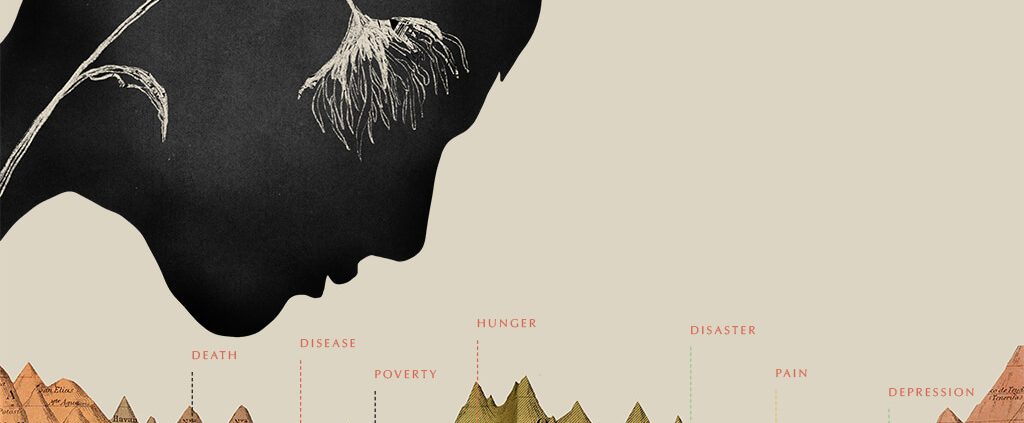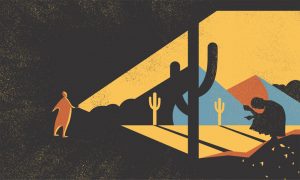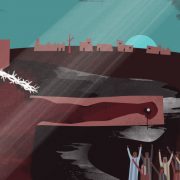How Dare God Create a World Filled with Suffering?
Written by Alex Stark, Australia
Alex Stark is pastor of Newlife Church—a church plant in Brisbane, Australia. He has a background as a fellow with OCCA the Oxford Centre for Christian Apologetics: researching, writing, and speaking in response to peoples’ questions about the Christian faith. He is particularly passionate about helping people see the beauty of the Christian story and apprentice to the way of Jesus, coming to know the life for which we were all made.
When I was growing up, I remember asking an adult “Why don’t you believe in God?” Her response stunned me: “If God was real, I wouldn’t have had seven miscarriages in a row.” Seven!
In 2015, on an Irish talk-show called The Meaning of Life, atheist Stephen Fry was asked what he would say to God if he found out God was real. Fry’s reply was shocking and powerful:
I’d say, ‘Bone cancer in children? What’s that about? How dare you? How dare you create a world to which there is such misery that is not our fault. It’s not right, it’s utterly, utterly evil.
Regardless of your race, gender, culture, or class, suffering is a reality which we all have to face. Whether we go through cancer, lose a loved one, experience mental ill-health, or even just turn on the news, suffering is a universal experience. And it evokes within each of us a question that we rally at the God who claims Himself to be both powerful and good: How can God allow it?
Yet this question itself sheds light on what we believe about suffering, the world, and God.
What Is Suffering, Anyway?
Experientially, suffering feels like an injustice. We want to say that it’s evil. In fact, our anger at God requires the assumption that suffering is indeed wrong. If suffering isn’t wrong, per se, then we’ve got nothing about which to be angry, and no reason to doubt the existence of God. So perhaps, the first question that should rightfully be asked is, “On what grounds can we say that suffering is wrong?”
Atheism says that this world came from nothing, is here for no divine purpose, and will ultimately end up being destroyed (through heat death or some other means). Suffering, therefore, is simply part of life. There’s nothing evil about it. It’s just natural. If there is no scale of justice and injustice outside of nature, then there’s no way to meaningfully say that suffering is actually wrong. C. S. Lewis, the writer of the Chronicles of Narnia, picked up on this when he was reflecting on his own conversion from atheism to Christianity. He said it like this:
My argument against God was that the universe seemed so cruel and unjust. But how had I got this idea of just and unjust? A man does not call a line crooked unless he has some idea of a straight line. What was I comparing this universe with when I called it unjust?
The Unique Claim of the Christian Story
The Christian story says that God made us for good and for Him. But we chose ourselves and evil was unleashed into the world. Now, we live in a broken world. Suffering, in the Christian worldview, is truly an injustice. It is not part of the world God wanted. So, when you experience suffering and cry out, “This isn’t the way the world is supposed to be,” you’re echoing the heart-cry of the God who mourns its brokenness. Rather than casting doubt on God’s existence, our experience of suffering actually acts as evidence for God’s existence. The existence of God gives us a measure of justice outside of ourselves by which to meaningfully say this world is not the way it should be.
The fact that this world is broken goes a long way in explaining the existence of suffering. Still, there is no way to perfectly explain our specific experiences of suffering. That would require comprehensive knowledge of the universe. But we are finite creatures. We do not have a God’s-eye-view of everything. Which means, sometimes there are reasons for our suffering known by God which we in our finitude cannot grasp. If God is big enough to be God, then He is big enough to know of reasons why we might suffer even if we cannot grasp them. That’s sobering. But it makes sense.
If God is greater than us—and I am happy to confess so—then there is indeed mystery in the universe. The task, therefore, is not to “act God” and try to perfectly explain the particular suffering we’re experiencing. That’s impossible. Rather, the task is to trust God through the mystery of our pain, in a world which the Bible itself describes as broken.
Mystery allows humans to say, “Though I cannot comprehensively trace God’s hand behind this particular experience of suffering, I can reasonably trust God’s character through the suffering.” We do that by interpreting our circumstances through what we know about God, rather than view God through the nature of our circumstances. That requires coming to know what is true about Him, and coming to un-know what is false about Him.
What Is God Truly Like?
Many people falsely think that God is distant and disinterested in the affairs of earthly life. It would be easy to be angry at that type of God. The problem is that the Bible doesn’t allow us to maintain that picture of God. The God of the Bible is the God who put on flesh in the person of Jesus Christ. John 1:1-4 talks about this. The Christian God is not the distant and disinterested divinity; He is the close and vulnerable God who stepped into our world of suffering.
It gets deeper, though. One of the first descriptors given by an observer of Jesus’ life was from Jesus’ contemporary, John the Baptist. John called Jesus “the lamb of God, who takes away the sin of the world” (John 1:29). And this points to the heart of the Christian understanding of God. The climax of the Christian story is a scene where God Himself, in history, is killed—like a lamb being slaughtered. Why? The answer is simple: He was dealing with all of our brokenness, all of our suffering, and all of our sin.
This is the unique claim of the Christian faith: that God shares with humanity in their suffering. The cross is where the brokenness of the world focused itself on God and broke Him, for us. Whatever suffering means, therefore, it cannot mean that God doesn’t love us or that He doesn’t care. He has done everything necessary to prove His love and care. He stepped into a suffering world and bore our suffering in His body. Sure, there is mystery in our particular experience of suffering, but there is no mystery surrounding the character and love of God. There is no one like Jesus.
To be sure, the Christian story holds that there is coming a day when God will come back to restore and renew the entire world (Rev 21:1-5). That gives each of us hope that sickness, suffering, decay, and death will not have the final word over the cosmos and our lives. This is the hope of the Christian story, and it is a powerful enough promise to help us face any suffering in this life. In the meantime, however, each of us inhabit the space between the tragedy of human rebellion and the triumph of God’s renewing work. And so the question before us is this: Will we trust God through our suffering, and anticipate together the day when He comes to do away with it?
Got more questions about the faith? Hop on here for a safe space to ask your questions.













Really did opened up my mind about God and suffering. Thank you!
Very insightful. Well done!
Is that sunflower in the ilustration of God? Why did you use the ilustrustion? I didn’t get it. In my opinion, you need to concern on your virtual arts more carefully because you need to see on how your audience read/describe our God especially for new Christians or non believers.
Praise God. Continue in your labour for the Lord.